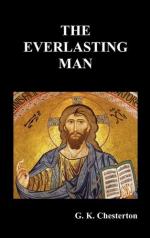
|
| Name: _________________________ | Period: ___________________ |
This test consists of 5 multiple choice questions, 5 short answer questions, and 10 short essay questions.
Multiple Choice Questions
1. What opinion does Chesterton hold of the concept "realpolitik," or the notion that men fight for material purposes?
(a) It is a simplistic rendering of a complex problem.
(b) It is an almost insanely unreal concept.
(c) None of these.
(d) It is true unless the men have religion.
2. How does Chesterton interpret the title of the book, "The Evolution of the Idea of God"?
(a) I will show you how this nonsensical notion that there is a God grew up among men.
(b) How mankind has lost their way.
(c) How God changes to suit the needs of every time and place.
(d) The growth of understanding morality.
3. According to Chesterton, how much did the philosophies of the great thinkers like Aristotle influence the religious spirit of the time?
(a) The philosophers were seen as heretics and the religion gained fervor.
(b) Not at all.
(c) They initiated conversation that changed the role of religion.
(d) The religion incorporated the principles of their philosophies.
4. What does Chesterton claim the evidence proves about cave men?
(a) None of these.
(b) They had no way of understanding the world.
(c) They were very much like men today.
(d) They already had organized religion.
5. If men were like other animals, what does Chesterton argue that we should see?
(a) Other animals rising in consciousness and language.
(b) None of these.
(c) Other animals attempting artistic expression.
(d) Religion among beasts.
Short Answer Questions
1. What does Chesterton say the cross represents?
2. In Part I, Chapter VII, what new thing does Chesterton say we need?
3. What does Chesterton think seeing mankind correctly will accomplish?
4. What does Chesterton say is the natural result of religion in the home?
5. What happens when an onlooker tries to envision the church as a member of a throng of superstitions lobbying for believers?
Short Essay Questions
1. How does Chesterton refute the idea that religion came from people's experiences with authority, dreams, and the cycles of life?
2. What does Chesterton mean when he refers to the "demons"?
3. Explain how, according to Chesterton, monotheistic religion becomes polytheistic.
4. How does Chesterton describe the religious experience of the Carthaginians?
5. How does Chesterton describe the religious experience of the Romans?
6. How does Chesterton define the view of non-Christians who live in a Christian society?
7. Explain how Chesterton says myths are best understood and appreciated. Explain your answer.
8. To what depiction of the cave-man does Chesterton most object and why?
9. In the beginning of the introduction, Chesterton uses an analogy of a boy leaving his farmland home and looking back on his homeland as he does so. What is he trying to explain or make clear with this analogy?
10. How does Troy and the Iliad enter into Chesterton's argument?
|
This section contains 1,072 words (approx. 4 pages at 300 words per page) |

|




